Table of Contents
Could the forgotten hero of nutrition, riboflavin, hold the key to shielding us from sepsis, ischemia, and the very risk of cancer itself?
As a nutritionist, I’m referring to riboflavin, as a natural vitamin that provides numerous biological benefits such as anti-oxidant, anti-aging, anti-inflammatory, anti-nociceptive, and anti-cancer properties.
Despite its importance, riboflavin is often overlooked and forgotten in our diets. However, it’s time to change that. By prioritizing riboflavin intake through dietary or supplemental means, we can safeguard our health against serious medical conditions and improve our overall well-being.
The time has come to rediscover the extraordinary potential of riboflavin and revolutionize the way we approach our health.
In this article, we will delve into the impact of riboflavin deficiency on health, explore the symptoms associated with inadequate intake, and shed light on the dietary riboflavin supplements and adequate riboflavin-rich dietary choices.
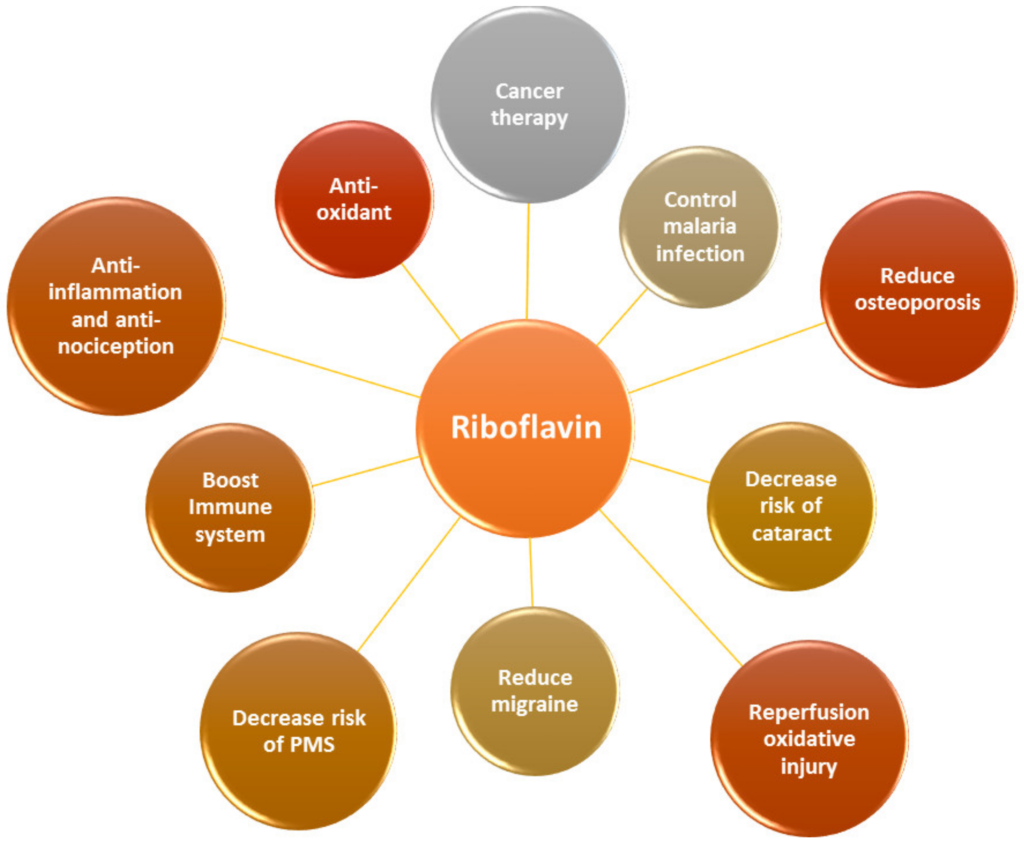
Lets start with some of the questions received at office@foodbodyfit.com
- Why riboflavin is important?
- What are the most common symptoms of Riboflavin deficiency?
- Are there any long-term health risks associated with prolonged Riboflavin deficiency?
- How can one tell if their body is not absorbing enough Riboflavin, and what can be done to increase absorption?
What foods are a natural source of riboflavin?
Are there any potential health risks associated with inadequate riboflavin intake on a vegan diet?
What is Riboflavin and why is important?
The discovery of riboflavin (RF) dates back to 1879, when Blyth documented a fascinating yellow pigment found within milk. Since then, riboflavin has emerged as an essential vitamin with a rich history, captivating scientists and nutrition enthusiasts alike.

Riboflavin is a water-soluble vitamin found in various dietary sources such as meats, milk, fatty fish, nuts, eggs, and vegetables like spinach and beans, as well as some fruits.
Furthermore, riboflavin is commonly added to vitamin fortified foods such as infant meals and cereals, and it has been proposed that some bacteria in the human microbiome can manufacture riboflavin.
While cooking does not have an impact on reducing the levels of riboflavin, there’s a key factor to be mindful of: light exposure. Interestingly, riboflavin is susceptible to destruction when exposed to light.
Importance
B-vitamins are crucial for fundamental cellular functions, one of the function is to metabolize carbohydrates, fats, and protein into glucose for energy. Riboflavin serves as both an energy booster and an antioxidant, promoting healthy immune function, skin, and hair.
Vitamin B2, also known as riboflavin, and its derivatives, flavin mononucleotide (FMN) and flavin adenine dinucleotide (FAD), are essential players in these processes. FMN and FAD serve as crucial cofactors for enzyme-catalyzed reactions.
Riboflavin plays a crucial role in the normal development of the body, lactation, physical performance, and reproduction.
Let me tell you a little secret 🙂
Riboflavin, with its distinctive yellow-green fluorescent pigment, holds a fascinating secret. When we consume riboflavin-rich foods or supplements, our body absorbs this nutrient, and a remarkable phenomenon occurs.
Our urine takes on a vibrant yellow hue, serving as a clear indicator that riboflavin has been successfully assimilated. But that’s not all.
Riboflavin plays a pivotal role in our body’s intricate biochemistry. It aids in the conversion of tryptophan to niacin, a process that activates the essential vitamin B6. This powerful connection between riboflavin, tryptophan, and vitamin B6 unlocks a cascade of physiological functions critical to our overall well-being.
As a nutritionist, it is important to reiterate the fact that humans lack the ability to synthesize riboflavin internally.
Instead, we must obtain this essential nutrient by consuming it through the foods we eat. By emphasizing the importance of including riboflavin-rich foods in our diets, we can ensure an adequate intake of this vital nutrient
How it is absorbed ?
Vitamin B2 is mainly absorbed in the small intestine, but can also be absorbed in the stomach, duodenum, colon, and rectum through active carrier-mediated transport by riboflavin transporter 3 (RFVT3).
After being absorbed, it is converted into FMN and FAD, and utilized by the epithelial cells found in the gastrointestinal tract. Alternatively, it can be transported to the bloodstream and distributed to the necessary tissues either through riboflavin transporter 1 (RFVT1) or riboflavin transporter 2 (RFVT2). RFVT2 is present throughout the body, with particularly high levels found in the brain, endocrine tissues, liver, and muscle.

Riboflavin deficiency
A deficiency in riboflavin (vitamin B2) can be caused by either a poor of dietary intake or endocrine abnormalities.
Riboflavin plays a crucial role as an antioxidant in our body, much like the powerful glutathione. Both riboflavin and glutathione work synergistically to combat free radicals, those harmful molecules that can contribute to the development of various diseases. By neutralizing free radicals, they help protect our cells and support the liver’s detoxification processes.
However, it’s important to note that riboflavin deficiency also can be caused by multiple factors, including chronic diarrhea, liver disorders, alcoholism, and undergoing hemodialysis. These conditions can disrupt riboflavin absorption or increase its requirements.
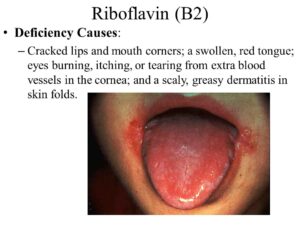
During periods of emotional or physical pressure, it becomes crucial to ensure an increased intake of this essential vitamin. Keeping a food diary becomes even more significant when considering the impact of stress on riboflavin intake. By documenting our daily food consumption, we gain valuable insights into our dietary habits and patterns. This allows us to identify any deficiencies or imbalances in our riboflavin intake, especially during times of emotional or physical pressure.
A food diary can help us track our riboflavin-rich food choices and ensure that we meet our increased nutritional needs during stressful periods. Furthermore, it enables us to monitor any potential interactions with substances like caffeine, alcohol, estrogen, or zinc that may affect riboflavin absorption, because Riboflavin is an water soluble vitamin As a nutritionist, recommending the practice of keeping a food diary becomes an invaluable tool for individuals to optimize their riboflavin intake and support their overall health and well-being.
Riboflavin plays a vital role in the production of thyroid hormone, which speed up metabolism and helps to ensure a steady supply of energy, also aids the body in producing infection-fighting immune cells; it works in conjunction with iron to manufacture red blood cells, which transport oxygen to all the cells in the body. In addition riboflavin produces substance that asists antioxidants, such as Vitamin E, in protecting cells against damage form the naturally occurring, highly reactive molecules known as free radicals.
It is essential for tissues maintenance and repair- the body use extra essential amounts to speed the healing of wounds after surgery, burns and other injuries.
The Role of Riboflavin in Homocysteine, Folic Acid and the Metabolism of Other Vitamins
Elevated levels of homocysteine, an amino acid produced from methionine, are linked to an increased risk of cardiovascular disease. The breakdown of homocysteine can occur through either transsulfuration, which requires vitamin B6, or remethylation, which depends on the presence of vitamins B9, B12, and riboflavin ( 21)
Groups at Risk of Riboflavin deficiency
Diet
The lack of riboflavin-rich foods, like milk and meat, is a common cause of riboflavin deficiency in developing countries.
Symptoms of vitamin B2 deficiency can range from mild, such as sore throat, skin inflammation and hair loss, to severe, such as swollen tongue, anemia and impaired nerve functions (26-29). Furthermore, anaemia will leads to fatigue. These symptoms typically only appear after several months of insufficient riboflavin intake. While this deficiency is less common in well developed countries subclinical deficiencies can still occur due to inadequate dietary intake.
Several studies on vitamin levels have highlighted the issue of insufficient riboflavin intake among children and young adults, particularly in young women (30) and vegan.
A national survey conducted in the United Kingdom discovered that riboflavin status among school children is poor and worsens with age. Boys have insufficient riboflavin intake starting from the age of 4, with 59% not meeting the recommended intake, increasing to 78% among 7-10-year-olds. However, girls aged 15-18 have the highest risk of developing riboflavin deficiency, with 95% having an insufficient intake. This survey highlights an alarming trend among schoolchildren that needs urgent attention. (30)
The rise in riboflavin deficiency among young boys and girls can be attributed to a decrease in milk consumption. While 4-6-year-olds get 25% of their daily riboflavin intake from milk, 15-18-year-olds only get 10%.
The effects of insufficient riboflavin intake, particularly in young girls, are not entirely understood. However, studies have demonstrated that even mild riboflavin deficiency can impact iron levels. Taking a daily dose of 2-4 mg of riboflavin for 8 weeks has been shown to effectively improve blood health in young women by increasing red blood cell count and hemoglobin concentrations – even without additional iron supplementation.
Aging
Research shows that a significant number of elderly individuals lack sufficient intake of riboflavin. Specifically, studies from the UK and the US indicate that between 10-41% of the elderly population are at risk of developing a riboflavin deficiency due to low dietary intake, primarily from milk and dairy products. However, there is another reason behind riboflavin deficiency due to low or poor absorption of riboflavin in the elderly population due to aging. Research supports the idea that older adults experience a decline in their ability to absorb riboflavin. Furthermore, a deficiency in riboflavin and other B vitamins has been linked to depression and cognitive performance changes in the elderly. Hence, riboflavin supplementation in older adults can act as a neuroprotective agent and help prevent diseases such as Parkinson’s, dementia, and Alzheimer’s. (38-39)
Exercise
The vitamin is also necessary to mantain the function of the eyes, and may be important for healthy nerves as well. In combination with other B vitamins, including vitamin B6 and niacin, it may help against a broad range of nerve of nerve and other ailments, including Alzheimer disease, epilepsy and multiple sclerosis, as well as anxiety, stress and even fatigue.
Pregnant women
An increasing number of reproductive-age women adopt vegan diets despite their deficiency in many essential nutrients. Although guidelines suggest supplementing with iron, zinc, and vitamin B12, they often fail to address the risk of riboflavin (vitamin B2) deficiency. It is important for healthcare professionals to be aware of this health concern in vegan diets.
Deficiency of this vital vitamin is commonly associated with various developmental abnormalities, including cleft lip and palate, growth retardation, and cardiac disease. It is important to be aware of this relationship in order to address and prevent these issues.
Prescribed medication
Certain medications, including anticholinergics, anticonvulsants, phenothiazines, and phenytoin, can hinder the absorption of riboflavin, leading to reduced levels in the body. Conversely, riboflavin can also interfere with some medications, such as the antibiotic tetracycline and the chemotherapy drug doxorubicin.
Women on birth control pills are at a higher risk for riboflavin deficiency as the body has difficulty absorbing this essential nutrient. Women should take caution in monitoring their riboflavin levels to maintain optimal health.
Daily recomendation
It’s important to get your daily dose of riboflavin. Dietary reference intakes can range from 1.0 to 1.3 mg/d for adults.
As adults, we need anywhere from 1.0 to 1.3 mg of riboflavin in our daily diets.
However, certain groups such as young adults, pregnant and lactating women, athletes, and elderly individuals may require even higher amounts of riboflavin intake. Any excess riboflavin is eliminated in the urine as riboflavin or as riboflavin-derived metabolites, 7-hydroxymethylriboflavin and lumiflavin.
Dosage 50 mg is adequate, although your practitioner may recommend higher doses for therapeutic purposes. The best supplements are those that contain all of the B vitamins.
What are the side effects of too much B2?
Recent studies have shown no reported complications linked to riboflavin supplement intake, even when taken at high doses.
As a nutritionist, it’s important to understand the various factors that can impact a person’s riboflavin levels. While diet plays the biggest role for the general population, there are other influencers to consider. These include pregnancy, exercise, aging, infections, and in rare instances, genetic variations.
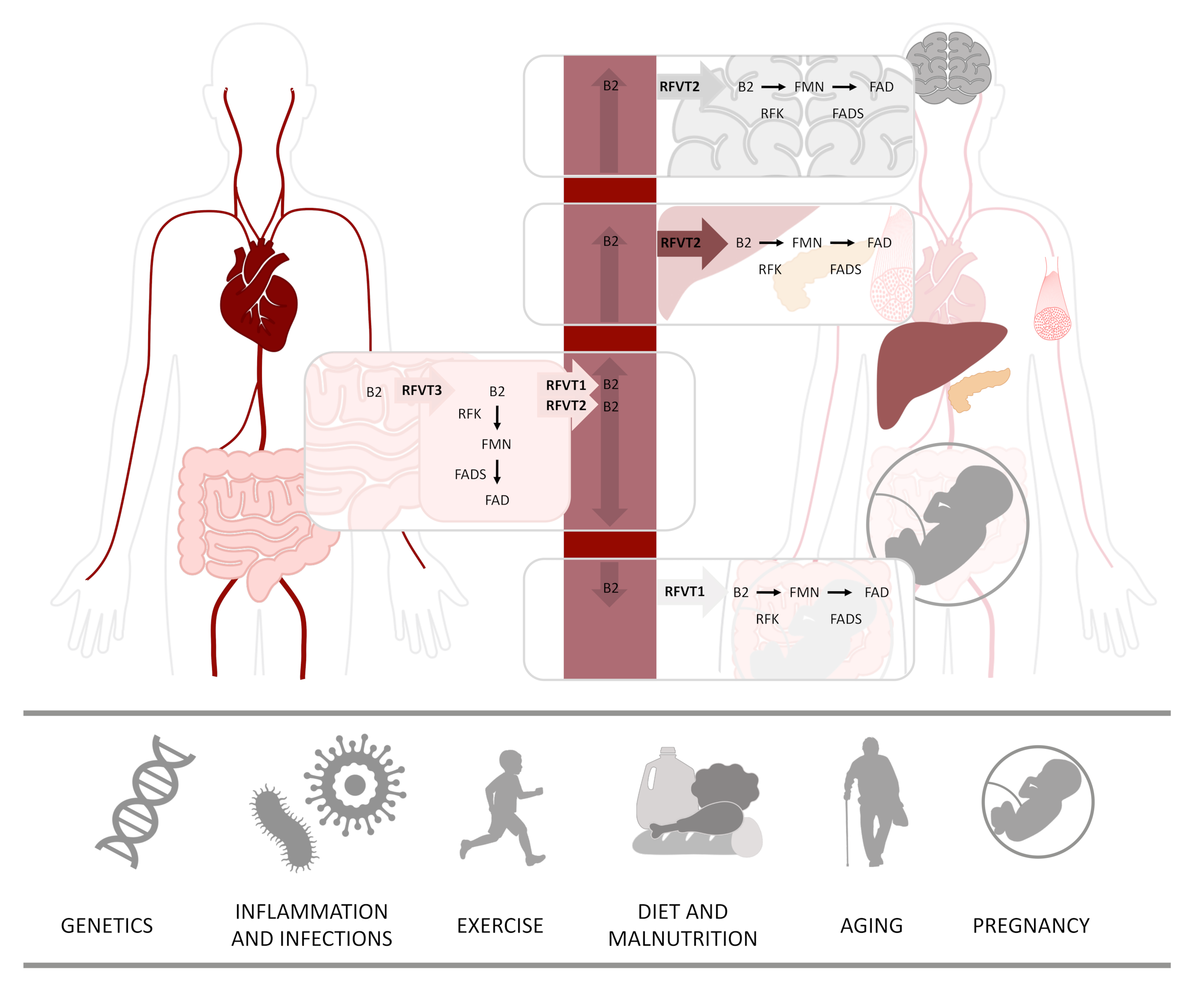
Dosage 50 mg is adequate, although your practitioner may recommend higher doses for therapeutic purposes. The best supplements are those that contain all of the B vitamins.
Facts:
Vitamin B2, riboflavin is far more stable than thiamine, although it can be destroyed by excess zinc, antibiotics, estrogen, caffeine, and alcohol. Sunlight can also destroy riboflavin, which is why milk cartons are made from opaques materials.
- Aids growths
- promotes skin, hair and nail health
- necessary for metabolism of fats, proteins and carbohydrates
- necessary for reproduction
- activates vitamin B6
- convert carbohydrates to energy
- reduces the frequency and severity of migraines
- Riboflavin has proved valuable in treating skin disorder including rosacea, which causes facial flushing and skin pustules in many adults.
Deficiency symptoms
Sore mouth, lips and tongue, insomnia, photosensitivity, bloodshot, gritty eyes, scale red skin on the sides of the nose. Stress increases your need for riboflavin.

Good sources. Milk, yogurt, liver, fish, eggs, meat, leafy green vegetables, yeast, fish, wholegrains, avocados, mushrooms.
Therapeutic uses: Some anemias, cataracts, vision problems ( in particular eye fatigue) acne rosacea and other skin problems, carpal tunnel syndrome.
Special notes: riboflavin is not toxic at any known level. However, some minor symptoms of excessive riboflavin include mild numbness and itching and burning sensation
Like thiamine, riboflavin requires other B vitamins to work most effectively.
A well balanced diet is especially important for the elderly, many of whom are deficient in riboflavin and other B vitamins.
Cautions
Reminder! If you have a medical or psychiatric condition, consult your doctor before taking supplements.
Madelena Tapliga

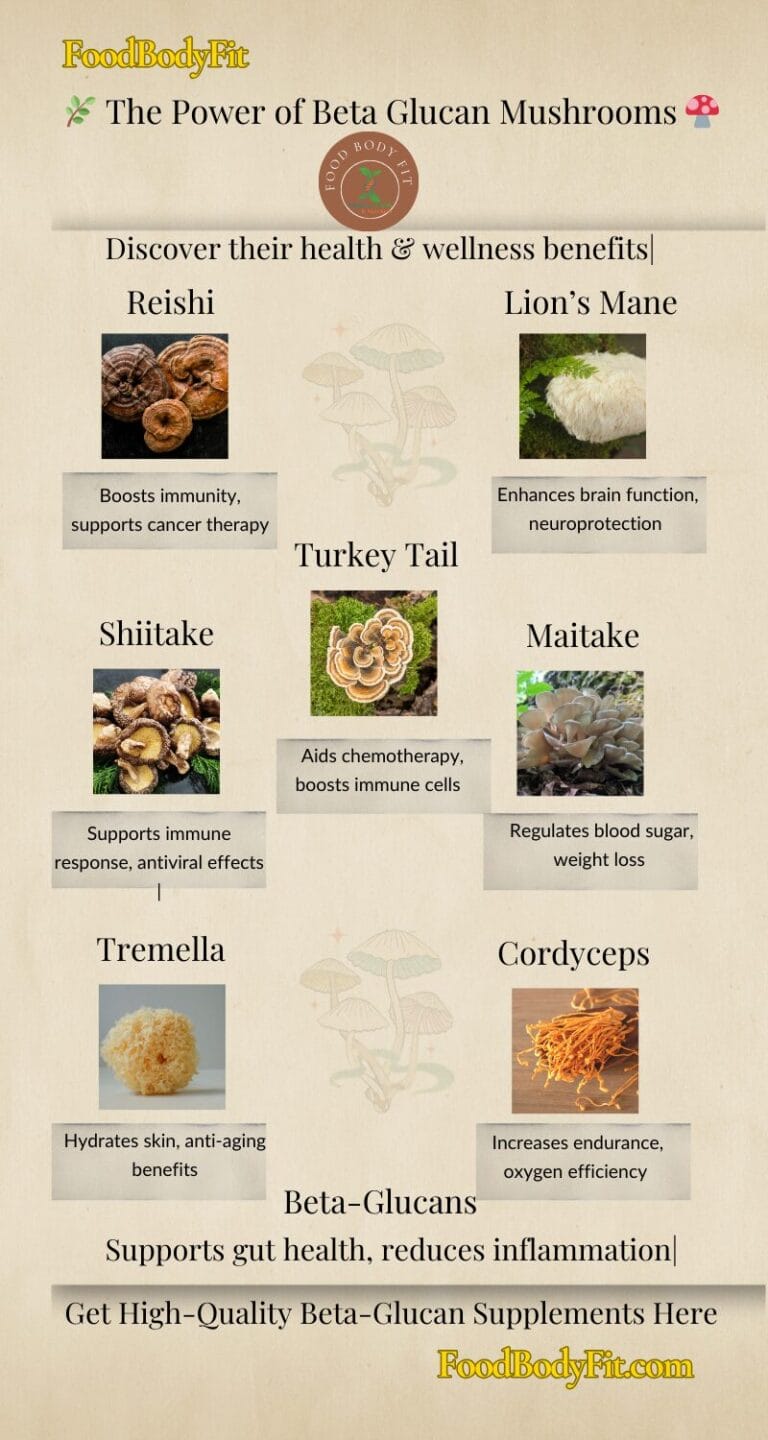
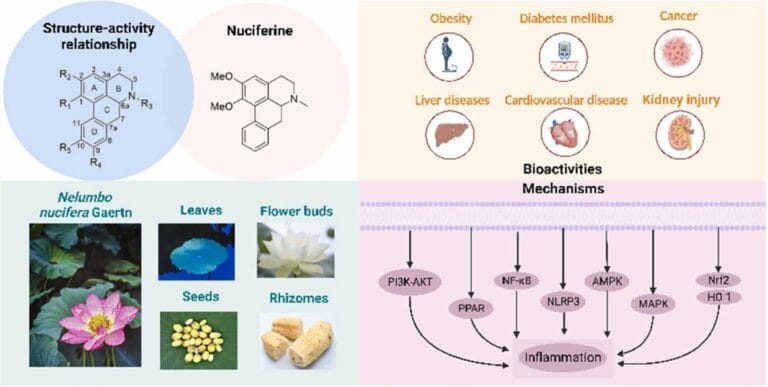
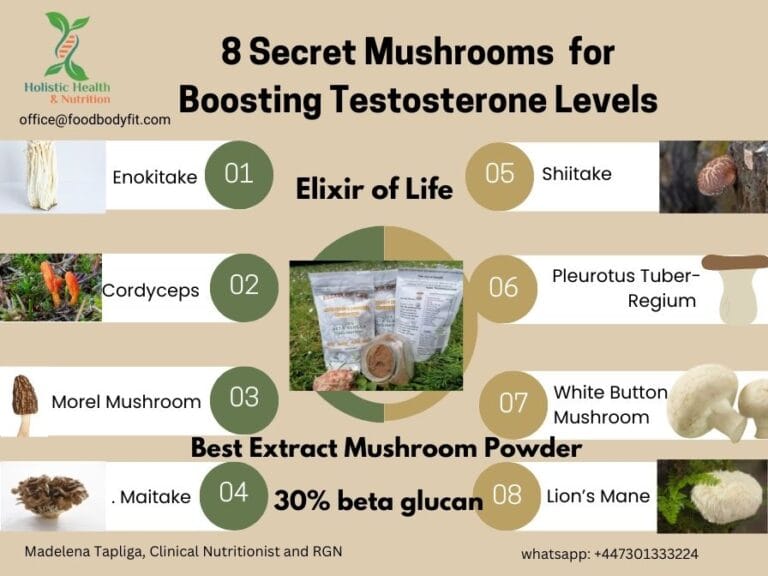
[…] Why Riboflavin is Crucial for Optimal Health and Wellness? […]
[…] Why Riboflavin is Crucial for Optimal Health and Wellness? […]